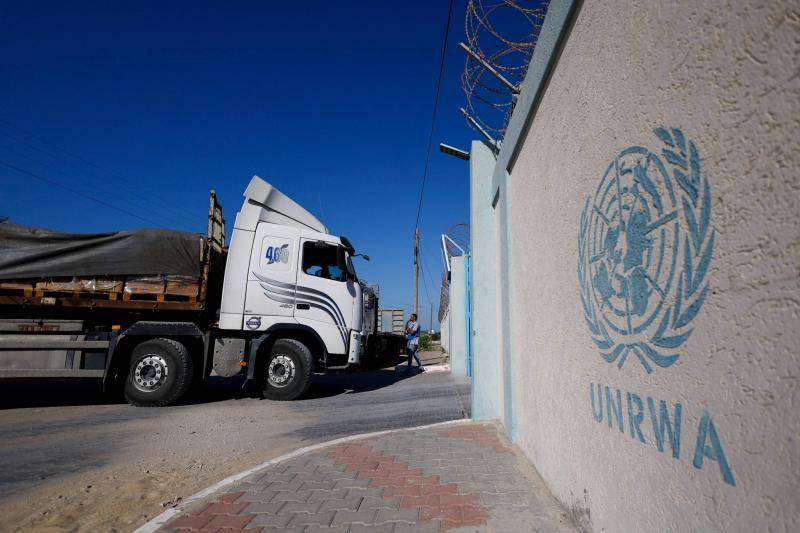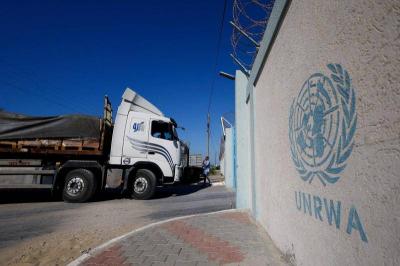The likelihood that the United Nations Relief and Works Agency for Palestine Refugees in the Near East (UNRWA) may have to halt its services by the end of February increases the sense of despair in refugee camps across the Middle East, where the agency has long represented a lifeline for millions. This possibility also raises concerns in Arab countries hosting refugees that lack the resources to fill the gap, fearing that any cessation of UNRWA services will significantly destabilize the situation.
UNRWA, which provides healthcare, education, and other services, is facing a significant crisis after Israel claimed that 12 of its 13,000 employees in Gaza were involved in the attack led by Hamas on Israel on October 7, which sparked the ongoing war in the territory. This led to donors suspending their funding for the agency. UNRWA hopes these donors will reconsider their decision after an initial report on these allegations is published in the coming weeks.
For Palestinians, the importance of UNRWA goes beyond just obtaining essential services; they view its presence as linked to preserving their rights as refugees, particularly their hope of returning to their homes, which they or their ancestors fled or were expelled from during the war accompanying Israel's establishment in 1948.
In the Burj al-Barajneh camp on the outskirts of Beirut, Raghda Al-Arabji expressed her reliance on UNRWA for the education of her two children and for covering medical bills for a third child who has an eye condition. Raghda (44) stated, "I have, for example, two sons in school. I don't pay for books, stationery, registration fees or school dues. I benefit from UNRWA for medical care. Now if there is no UNRWA, I can't do all of this."
She added that the agency also covered cancer treatment costs for her late husband, who passed away five months ago. Raghda described Burj al-Barajneh, a residential area consisting of dilapidated buildings and narrow streets, as relying on UNRWA in various ways, including programs that provide $20 daily for workers, which is significant for refugees who are barred from many jobs in Lebanon. She described the difficult situation for Palestinians in Lebanon, saying, "We are dying while we are living." She appealed to donors to continue funding UNRWA, stating, "Don’t kill our hope; I see many things that are very difficult."
UNRWA was established in 1949 to provide essential services to refugees. The agency currently serves approximately 5.9 million Palestinians across the region. Over half a million children attend its schools, and its clinics receive more than seven million visits annually, according to UNRWA's website. Juliette Touma, UNRWA's communications director, stated in an interview with Reuters, "The role that this agency has played in protecting the rights of Palestinian refugees is fundamental."
UNRWA indicated that if the allegations against its twelve staff members prove true, it would represent a betrayal of the values of the United Nations and the people it serves. The attack led by Hamas resulted in the deaths of 1,200 individuals and the abduction of 240 others, according to Israeli statistics. Since then, an Israeli assault has led to the deaths of over 27,000 people in Gaza, according to health officials in the Hamas-run territory.
Israel wants UNRWA to cease its operations. Prime Minister Benjamin Netanyahu said: "We must replace UNRWA with other United Nations agencies and other aid agencies if we want to resolve the problem in Gaza as planned."
### "Catastrophic Situation"
Arab countries hosting refugees have traditionally supported the Palestinians' right to return, rejecting any proposals suggesting they should be resettled in countries where they fled in 1948. This issue raises longstanding concerns in Lebanon about how the presence of mainly Sunni refugees affects the sectarian balance. UNRWA estimates that there are up to 250,000 Palestinian refugees residing in Lebanon.
Hector Hajjar, Lebanon's caretaker Minister of Social Affairs, said that the decisions by donor countries to suspend aid are unjust and politically motivated and that the consequences would be "catastrophic" for Palestinians. He added in an interview with Reuters, "If anyone saw the camps, they are in miserable conditions. If we prevent Palestinians from what they can do, we are telling them to either go to death or resort to extremism." He emphasized that the decision would destabilize both Lebanese and Palestinian communities, along with refugees fleeing the war in neighboring Syria.
In Jordan, the UNRWA crisis has highlighted long-standing fears. Jordan hosts around two million registered Palestinian refugees, most of whom hold Jordanian citizenship. Officials are concerned that any move to dismantle UNRWA may undermine their right to return, shifting the burden onto Jordan.
Norway, one of the donors that has not cut its funding to the agency, expressed cautious optimism that some countries that temporarily stopped their funding will resume it, noting that the situation cannot last long. The United States stated that UNRWA needs to make "substantial changes" before funding can be resumed.
Moussa Ibrahim Dirawi, a refugee in Burj al-Barajneh, expressed his fears for Palestinian children if UNRWA schools had to close their doors. He added, "You are helping to deny an entire generation of education. When you can’t put your child in school, you have to leave them on the street; what does the street teach?"




